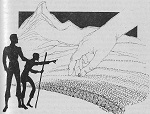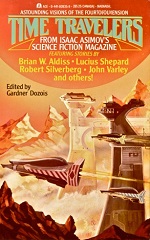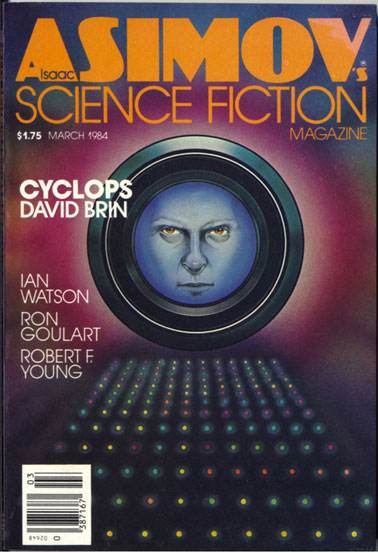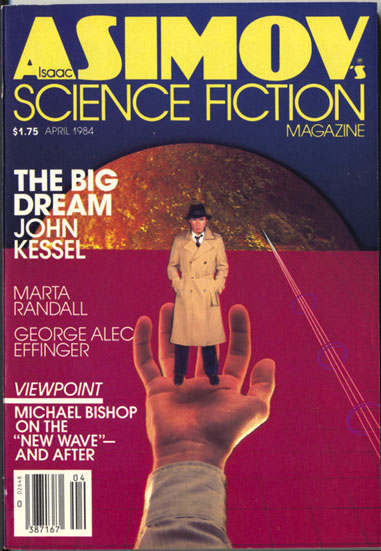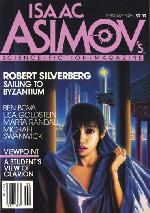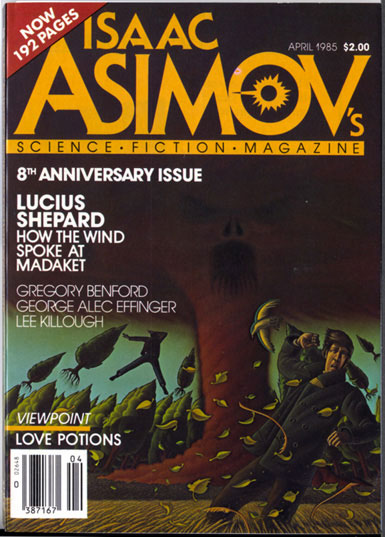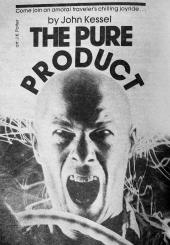Short Story
Time Travelers’: From Isaac Asimov’s Science Fiction Magazine
Tag Area: Anthology
- Filter: Show all works, including those with no time phenomena.
- Found: 10 results in 6.63ms
Short Story
The Small Stones of Tu Fu
- by Brian Aldiss
- in Asimov’s Science Fiction, March/April 1978
A time traveler enjoys spending time with the aged poet Tu Fu in 770 A.D.
Swimming strongly on my way back to what the sage called the remote future, my form began to flow and change according to time pressure. Sometimes my essence was like steam, sometimes like a mountain.

Short Story
The Comedian
- by Tim Sullivan
- in Asimov’s Science Fiction, June 1982
A projected vision from the future takes on the forms of various 20th century comedians from Charley Chaplin to Don Rickles, and he’s also making wildlife manager Chris Reilly kidnap children.
The comedian looked just like a living, breathing, three-dimensional human being, the reincarnation of Lenny Bruce, come to see the unhappy world end.

Short Story
Ghost Lecturer
- by Ian Watson
- in Asimov’s Science Fiction, March 1984
A conceited man brings Lucretius to the present in order to explain to the classical scientist exactly where he was wrong, but it turns out that Lucretius’s classical atomism was brought along with him.
What’;s happening? I’ll tell you what’s happening. Those “films” you see flying off surfaces and hitting your eyes—that’s how our friend here thought visions worked. And now we’re seeing it happen, as though it’s true.

Short Story
Twilight Time
- by Lewis Shiner
- in Asimov’s Science Fiction, April 1984
Travis goes back to the 1961 dance where he met his now-departed sweetheart, but he also has memories of aliens who quietly took over the world.
A decade of peace and quiet and short hair was winding down; a time when people knew their place and stayed in it. For ten years nobody had wanted anything but a new car and a bigger TV set. Now all that was about to change. In a little over a year the Cuban missile crisis would send thousands of people into their back yards to dig bomb shelters, and “advisors” would start pouring into Southeast Asia. In another year the president would be dead.

Short Story
Short Story
Sailing to Byzantium
- by Robert Silverberg
- Isaac Asimov’s Science Fiction Magazine, February 1985
Charles Phillips is a 20th-century New Yorker in a future world of immortal leisurites who reconstruct cities from the past. —Michael Main
He knew very little about himself, but he knew that he was not one of them. That he knew. He knew that his name was Charles Phillips and that before he had come to live among these people he had lived in the year 1984, when there had been such things as computers and television sets and baseball and jet planes, and the world was full of cities, not merely five but thousands of them, New York and London and Johannesburg and Parks and Liverpool and Bangkok and San Francisco and Buenos Ares and a multitude of others, all at the same time.

Short Story
Klein’s Machine
- by Andrew Weiner
- Isaac Asimov’s Science Fiction Magazine, April 1985
After Philip Herbert Klein returns from a psychosis-inducing trip in his time machine, he has philosophical conversations with his psychiatrist.
The hamster is back. Also my wristwatch, which I strapped on its back.

Novelette
The Pure Product
- by John Kessel
- in Asimov’s Science Fiction, March 1986
A cynical sociopath from the future goes on a crime spree (sometimes with random blood, sometimes with trite tripping on his future drugs) across 20th-century North America. —Michael Main
“I said, have you got something going,” she repeated, still with the accent—the accent of my own time.

Novelette

